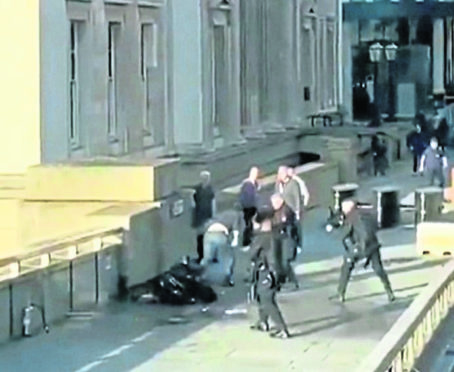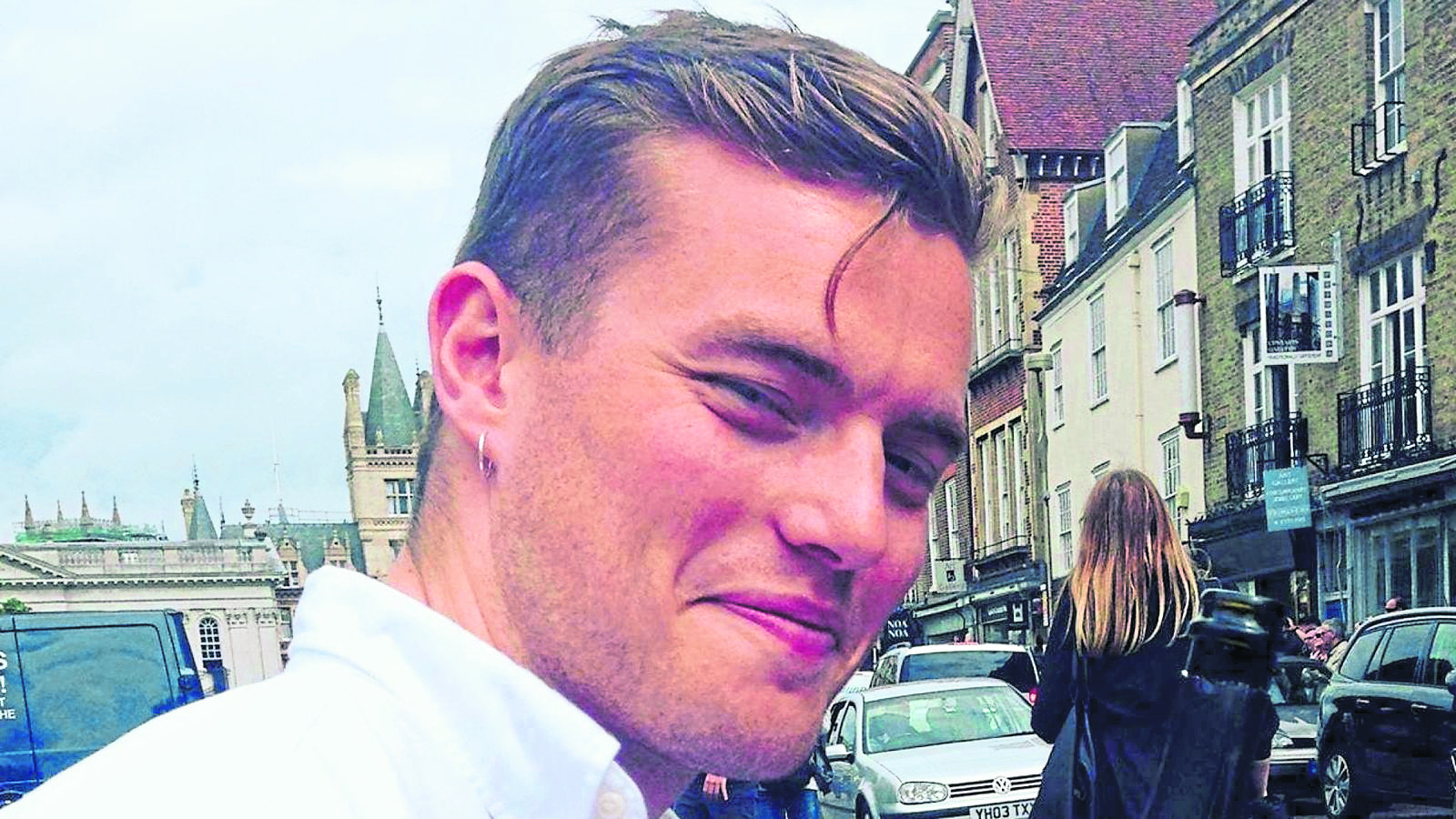
Politicians called for an explanation yesterday after it emerged London Bridge attacker Usman Khan was freed from jail less than seven years into a 16-year sentence for terrorism.
Khan was wearing an electronic tag when he killed two people and injured three others during an attack on Friday and had been released
from prison automatically on licence last December.
He had been jailed in 2012 after police and security services uncovered a plot by his nine-strong terror cell to bomb the London Stock Exchange and build a terrorist training camp.
Sentencing him, Judge Mr Justice Wilkie said Khan had been working on an “ambitious and serious” jihadist agenda.
He told the court: “In my judgment these offenders would remain, even after a lengthy term of imprisonment, of such a significant risk that the public could not be adequately protected by their being managed on licence in the community.”
Khan, of Stoke-on-Trent, had successfully appealed his initial indeterminate sentence, handed down for public protection, and was given a fixed term of 16 years in April 2013 instead.
Despite his trial judge’s warning over the danger he posed, Khan was released last December subject to licence conditions and forced to wear an electronic monitoring tag.
Speaking yesterday at the scene of Friday’s attack, in which two people died and three more were injured, PM Boris Johnson said: “I’ve said for a long time that I think the practice of automatic early release – where you cut a sentence in half and let really serious violent offenders out early – simply isn’t working.
“And I think you have good evidence of how that isn’t working, I’m afraid, with this case.”
Labour leader Jeremy Corbyn called the attack “a complete disaster”, and said a full investigation into the way the justice system had operated was required.
He said: “I think there is a question about what the Probation Office was doing, was it involved at all, and whether the Parole Board should have been involved in deciding whether or not he should have been released from prison in the first place.
“And what happened in prison? Was someone, who clearly was a danger to society, given a deradicalisation programme? We need to all know the answer to those questions urgently. We need to investigate fully the way all aspects of the criminal justice system operates.”
Lib Dem leader Jo Swinson said the attack raised questions about the release of convicted terrorists. She said: “I want us to understand the details of this and the questions that need to be asked about how decisions are made on release and how risks are assessed on that basis.”
Labour’s Yvette Cooper posted on social media yesterday: “He was released six years later without Parole Board assessment. How could this be allowed to happen?”
Home Secretary Priti Patel replied: “Because legislation brought in by your government in 2008 meant that dangerous terrorists had to automatically be released after half of their jail term.
“Conservatives changed the law in 2012 to end your automatic release policy but Khan was convicted before this.”
Chris Phillips, a former head of the UK national counter-terrorism security office, said: “The criminal justice system needs to look at itself.
“We’re convicting people for very serious offences and then they are releasing them back into society when they are still radicalised.
“We’re playing Russian roulette with people’s lives, letting convicted, known, radicalised jihadi criminals walk about our streets.”
Former chief Crown prosecutor Nazir Afzal said the Government had been repeatedly warned of the risk posed by convicted terrorists being released from prison.
The current system allows prisoners to be freed on a home detention curfew – an electronic tag – before completing half their sentence. Khan was also required to take part in the government’s Desistance and Disengagement Programme, aimed at rehabilitating those involved in terrorism.
He is believed to have lived latterly in a townhouse in Wolverhampton Road, Stafford, where he was required to wear a tag that activates an alert if he leaves his house at certain times. He also had to comply with other conditions.
On Friday, he attended the Learning Together criminal justice conference for former prisoners at Fishmongers’ Hall on London Bridge. Khan took part in workshops and described his experiences in jail – before launching his deadly assault without warning just before 2pm.
Witnesses said Khan, 28, carried out his attack wielding a large knife with a back-up blade strapped to his wrist. He attacked at least five people, two of whom, including course co-ordinator Jack Merritt, were fatally injured, before being apprehended on London Bridge.
Khan appeared to be attempting to detonate a suicide vest – later discovered to be a fake – while being tackled by unarmed bystander.
Armed police who ran to the scene dragged the man off Khan who, as he tried to get up, was shot twice.
Born and raised in Stoke-on-Trent, Khan was convicted in 2012 for his role in a plot involving a Christmas attack on the London Stock Exchange, the American embassy and the home of then Mayor of London Boris Johnson.
He and gang members had worked for Islam4UK – a terrorist organisation.
The Queen and Duke of Edinburgh yesterday sent a message of sympathy to those injured and to the relatives of those killed and praised the “brave individuals who put their own lives at risk to help and protect others”.
First Minister Nicola Sturgeon said: “Our minds and hearts are first and foremost with those whose lives have been shattered.”
Metropolitan Police Commissioner Cressida Dick confirmed police are not actively seeking anyone else over the attack.
The Victims
One of the victims of the London Bridge attack was the co-ordinator of the ex-prisoners’ course that terrorist Usman Khan had been attending before launching his attack.
Jack Merritt, 25, was described as a “beautiful spirit” yesterday after he died along with a woman victim in the knife rampage on Friday afternoon.
Mr Merritt, of Cambridge, had been at the Learning Together event at Fishmongers’ Hall in London when the attack unfolded.
His dad David yesterday paid tribute to his son, writing on Twitter: “My son, Jack, who was killed in this attack, would not wish his death to be used as the pretext for more draconian sentences or for detaining people unnecessarily.
“RIP Jack: you were a beautiful spirit who always took the side of the underdog.”
He said his son had been a champion for those “dealt a losing hand by life, who ended up in the prison system”.
David added that the Cambridge community was in “shock” after the attack, which has left another three people injured.
Friends yesterday paid tribute to Jack, with one stating: “He was the sweetest, most caring and selfless individual I’ve ever met.
“The warmest heart, always with time for anyone. Completely irreplaceable – I will mourn his loss greatly and honour his memory.”
Khan killed two people and injured three others. The hospital where victims were rushed on Friday was placed in a state of emergency
as the incident unfolded.
One witness said five victims were taken to the Royal London Hospital. Two could not be saved while the other three suffered serious injuries.
Speaking outside the hospital, in the city’s Whitechapel, patients described police officers on every floor when the building went into “lockdown”.
Further armed officers provided security back-up in and around the building yesterday.
A woman, visiting her mum at the hospital yesterday, added: “When we arrived there were police everywhere. Inside, the building was on lockdown.”
The injured are understood to include a man in an induced coma and a woman in her 20s with slash wounds to her arms and stomach.

Enjoy the convenience of having The Sunday Post delivered as a digital ePaper straight to your smartphone, tablet or computer.
Subscribe for only £5.49 a month and enjoy all the benefits of the printed paper as a digital replica.
Subscribe